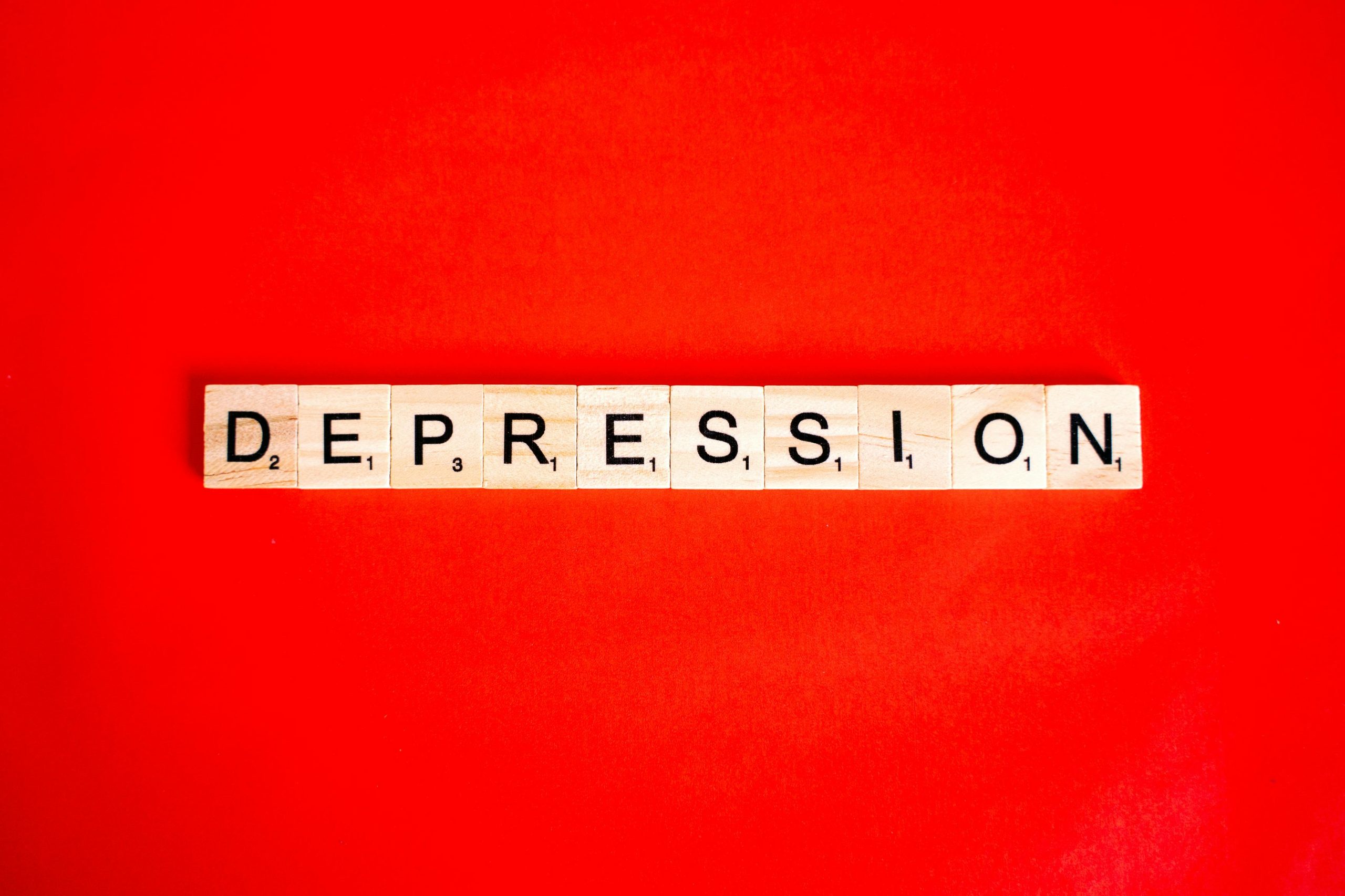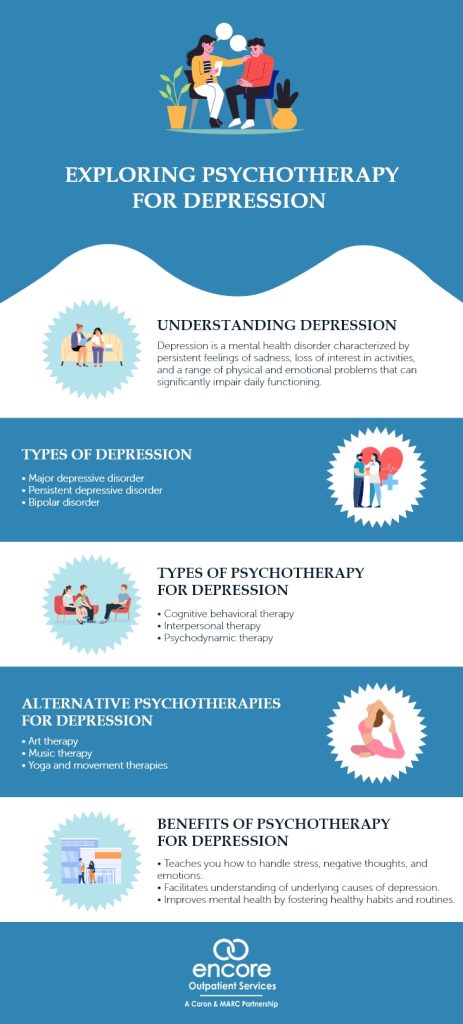Our dedication lies not just in treating symptoms but in addressing the root causes, offering a holistic approach that integrates the best of therapeutic practices with the warmth of community support.
Exploring Psychotherapy for Depression

As the global prevalence of depression continues to rise, there is a growing focus on comprehensive and effective therapeutic approaches to address the multifaceted aspects of depression. This article aims to provide a clear and comprehensive overview of how psychotherapy, a method involving professional therapeutic interaction, can be an effective tool in managing and treating depression. We will delve into various psychotherapy approaches, their mechanisms in alleviating depressive symptoms, and the benefits they present. Additionally, we will discuss how psychotherapy can be integrated with other treatments for a holistic approach. Our goal is to present an informative view so that you can make educated decisions regarding your mental health treatment.
Understanding Depression
Depression is a common but serious mood disorder that significantly affects how a person feels, thinks, and handles daily activities. It’s characterized by persistent feelings of sadness and loss of interest or pleasure in activities and can lead to a variety of emotional and physical problems. Depression is not just a temporary change in mood or a sign of weakness; it’s a real medical condition with many emotional, physical, cognitive, and behavioral symptoms. According to the American Psychiatric Association (APA), depression affects around one in 15 adults each year, and one in every six people will experience depression at some point in their lives.
It’s important to recognize that depression is more than just feeling sad. Symptoms of depression can include changes in sleep, appetite, energy level, concentration, daily behavior, or self-esteem. Depression can also be associated with thoughts of suicide. The causes of depression are complex and can vary widely from person to person, involving genetic, biological, environmental, and psychological factors.
Depression is diagnosed by a medical professional based on the patient’s symptoms, duration, and degree of impairment. It’s crucial to understand that depression is treatable, effective treatments are available, and early diagnosis and intervention can significantly improve the outcome.
Types of Depression
Depression manifests in various forms, each with its unique features, symptoms, and severity. Understanding the different types of depression is crucial for effective treatment and management. The primary forms include:
- Major Depressive Disorder (MDD) – This is the most common form, characterized by persistent and intense feelings of sadness and a lack of interest in previously enjoyed activities. It significantly impacts daily functioning.
- Persistent Depressive Disorder (PDD) – This depressive disorder is marked by a chronic state of depression, with symptoms lasting for at least two years. While not as severe as major depression, its long duration can be debilitating.
- Bipolar Disorder – This condition, previously known as manic depression, involves episodes of depression alternating with episodes of mania or hypomania.
- Seasonal Affective Disorder (SAD) – This type of depression is related to changes in seasons, often starting in the fall and continuing into the winter months, and is characterized by mood changes and lethargy.
- Postpartum Depression – This depressive disorder occurs in women after giving birth and is more severe than the “baby blues.” It includes intense feelings of sadness, anxiety, and exhaustion that may interfere with a woman’s ability to care for herself or her family.
- Psychotic Depression – This is a subtype of major depression. This type of depression includes losing touch with reality or experiencing psychosis, with symptoms such as hallucinations.
- Atypical Depression – This type of depressive disorder is characterized by mood reactivity (moods that can improve in response to positive events). Symptoms can include increased appetite, sleeping too much, a heavy feeling in the limbs, and sensitivity to rejection.
Each type of depression has its nuances and requires a tailored approach to treatment. It’s important for those experiencing symptoms to seek professional evaluation to determine the specific type of depression and appropriate treatment plan.

Types of Psychotherapy for Depression
Psychotherapy, often referred to as “talk therapy,” is a vital treatment option for depression, involving various techniques and approaches. Here are some of the common types of psychotherapy for depression:
- Cognitive Behavioral Therapy (CBT) – CBT is considered a first-line treatment for depression. It focuses on identifying and changing negative thought patterns and behaviors. CBT helps patients challenge distorted thinking and develop more constructive ways of coping with depressive symptoms.
- Interpersonal Therapy (IPT) – IPT concentrates on the relationships of the patient and how these interactions affect the person’s mood. This therapy helps individuals improve their communication skills and increase their understanding of relational dynamics contributing to their depression.
- Psychodynamic Therapy – This approach explores how unresolved past experiences and unconscious feelings may influence current behavior and thoughts. Psychodynamic therapy aims to increase self-awareness and understand the influence of the past on present behavior.
- Dialectical Behavior Therapy (DBT) – DBT can significantly decrease depression symptoms. It focuses on teaching individuals skills such as emotional regulation, mindfulness, distress tolerance, and interpersonal effectiveness, all of which are useful in controlling depressive symptoms.
- Mindfulness-Based Cognitive Therapy (MBCT) – MBCT combines cognitive therapy with mindfulness strategies. It teaches individuals to focus on the present moment and be aware of their thoughts and feelings without becoming overwhelmed by them.
- Supportive Therapy – This type of psychotherapy provides emotional support and guidance to help individuals cope with stressors and manage their depression symptoms.
- Behavioral Activation (BA) – BA is a type of cognitive behavioral therapy that focuses specifically on increasing engagement in positive activities to address depressive symptoms.
- Group Therapy – In group therapy, individuals with depression meet with a therapist in a group setting. It provides a support network and allows participants to learn from the experiences of others.
- Family Therapy – Family therapy focuses on addressing interpersonal problems and family dynamics that may contribute to depression. It involves the participation of family members and can be beneficial in improving the overall wellness of the family and changing patterns of dysfunction.
Each of these psychotherapies offers different approaches to treating depression and can be tailored to the individual’s needs. The choice of psychotherapy often depends on the severity of the depression, the patient’s personal preferences, and the therapist’s expertise. It’s important for individuals to work with their healthcare provider to determine the most appropriate psychotherapy for their specific situation.
Alternative Psychotherapies for Depression
In addition to traditional psychotherapy methods, there are alternative approaches that can be effective in treating depression. These therapies often complement mainstream treatments and offer additional pathways for healing and recovery:
- Art Therapy – This psychotherapy uses creative processes like painting, drawing, or sculpting to help individuals express themselves and explore their emotions. It can provide a non-verbal outlet for feelings and promote self-discovery and emotional growth.
- Music Therapy – In music therapy, patients engage with music either by listening, creating, or discussing music, guided by a trained therapist. It can help express emotions, improve mood, and provide a sense of calm and relaxation.
- Mindfulness and Meditation Techniques – These practices can help individuals become more aware of their thoughts and emotions, which can be beneficial in managing depressive symptoms.
- Breathwork and Relaxation Techniques – These techniques can help individuals reduce stress and anxiety, which can contribute to depression.
- Yoga and Movement Therapies – Yoga and other movement therapies can help individuals improve their physical and mental well-being, which can be beneficial in managing depression.
- Psychodrama Therapy – This type of therapy can help individuals explore their emotions and behaviors in a more experiential way, which can be beneficial in managing depression.
- Nature-Based Therapy – Spending time in nature can help individuals reduce stress and improve their mood, which can be beneficial in managing depression symptoms.
- Animal-Assisted Therapy – Interaction with animals, such as dogs or horses, has been shown to have a therapeutic effect. It can reduce symptoms of depression by enhancing emotional well-being and providing comfort and support.
These alternative psychotherapies provide diverse options for individuals seeking different ways to manage depression. It’s important to consider these therapies as potential supplements to traditional treatments rather than replacements. Consulting with a mental health professional can help in determining the most suitable approach for each individual’s needs.
How Psychotherapy Treats Depression
Psychotherapy plays a significant role in the treatment of depression by addressing the psychological aspects of the disorder. It helps patients in several key ways:
- Understanding and Managing Thoughts – Psychotherapy assists individuals in identifying negative or distorted thinking patterns that contribute to feelings of depression. Through techniques like cognitive restructuring, patients learn to replace these thoughts with more positive and realistic ones.
- Processing Emotions – This type of therapy provides a safe space for patients to express and process their emotions. It helps in understanding and managing feelings of sadness, guilt, or anger, which are often associated with depression.
- Improving Behavior Patterns – Therapists work with patients to develop healthy coping mechanisms and behaviors. This may include setting realistic goals, engaging in enjoyable activities, and improving daily routines to support better mental health.
- Enhancing Relationship Skills – Many forms of psychotherapy, such as interpersonal therapy, focus on improving relationships. Individuals can strengthen their support network by building communication skills and resolving conflicts, which is crucial in managing severe depression.
- Building Resilience – Psychotherapy helps in developing resilience against future depressive episodes. Patients learn strategies to handle stress and challenges more effectively, reducing the risk of relapse.
- Personal Insight and Self-Awareness – Psychotherapy encourages self-exploration and insight, helping individuals understand the underlying causes of their depression. This deeper understanding can empower patients to make meaningful changes in their lives.
Psychotherapy is not a one-size-fits-all solution and may be combined with other treatments, such as medication, for optimal effectiveness. The duration and success of psychotherapy depend on various factors, including the severity of the depression, the specific therapy type, and the individual’s active participation in the process.
Benefits of Psychotherapy for Depression
Psychotherapy offers several key benefits in the treatment and management of depression, making it a valuable component of mental health care:
- Addresses Root Causes – Unlike medications that primarily treat symptoms, psychotherapy delves into the underlying causes of depression. It helps patients understand and resolve the root psychological factors contributing to their condition.
- Treats Co-occurring Disorders – Psychotherapy is effective in treating co-occurring disorders and dual diagnosis, which involve the simultaneous treatment of depression and substance use disorders. This approach ensures that both conditions are addressed in an integrated manner.
- Develops Coping Strategies – Through psychotherapy, individuals learn practical and effective coping strategies to manage stress, negative thoughts, and emotional challenges, equipping them to handle future difficulties more effectively and reducing the reliance on substances as a coping mechanism.
- Improves Self-Esteem and Confidence – Engaging in psychotherapy can lead to increased self-esteem and self-confidence as individuals gain a better understanding of themselves and develop skills to manage their mental health condition.
- Enhances Communication and Interpersonal Skills – Psychotherapy often involves learning how to communicate feelings and needs more effectively, which can improve personal and professional relationships.
- Long-Term Benefits – The skills and insights gained from psychotherapy can provide long-lasting benefits. Patients often experience enduring improvements in their mental health beyond the immediate alleviation of depressive symptoms.
- Reduces the Risk of Suicide – Psychotherapy has been demonstrated to lower the risk of suicide among people suffering from severe depression. For example, psychodynamic psychotherapy has been found to reduce the risk of recurrent suicide attempts and self-injury.
- Personalized Treatment – Psychotherapy is tailored to the individual’s specific needs and circumstances, offering a personalized approach to treatment that considers the whole person, not just their symptoms.
- Safe and Supportive Environment – Psychotherapy provides a safe and confidential space for individuals to discuss their thoughts and feelings, which is essential for healing and recovery.
- Reduces Reliance on Medication – For some individuals, psychotherapy can reduce or eliminate the need for antidepressant medications, especially in cases of mild to moderate depression.
By addressing various aspects of mental health, psychotherapy for depression not only helps in alleviating current symptoms but also equips individuals with the tools and knowledge to maintain their mental health in the long term.
Combining Psychotherapy with Other Treatments
Integrating psychotherapy with other treatments often enhances the effectiveness of depression management. This holistic approach addresses multiple facets of the disorder:
- Medication – Combining psychotherapy with other treatments, such as medication, is often considered the most effective approach for treating depression.
- Lifestyle Changes – Incorporating healthy lifestyle choices like regular exercise, a balanced diet, adequate sleep, and stress reduction techniques can support the treatment process. These changes can improve overall well-being and resilience.
- Support Groups – Participating in support groups provides an additional layer of social support and understanding. Sharing experiences with others facing similar challenges can be validating and encouraging.
- Complementary and Alternative Therapies – Integrating treatment with complementary and alternative therapies such as mindfulness, meditation, or yoga can be effective in reducing symptoms of depression and promoting overall well-being.
- Ongoing Care – For those with coexisting medical conditions or substance use disorders, consistent and ongoing care is crucial. Physical health complications and substance use disorders can impact mental health and vice versa, so integrated care is important.
It’s important for individuals to work closely with healthcare providers to create a personalized treatment plan that considers all aspects of their health. This collaborative approach ensures that all treatments are compatible and effective in addressing the multifaceted nature of depression.
Finding the Right Therapist
Choosing the right therapist is a crucial step in your journey towards managing depression. Here are key factors to consider in this process:
- Credentials and Expertise – Ensure the therapist is licensed and has expertise in treating depression. Look for professionals with relevant degrees and certifications in psychology, psychiatry, counseling, or social work.
- Therapeutic Approach – Therapists specialize in various types of psychotherapies. Research these methods and consider which one aligns best with your needs and preferences.
- Experience with Specific Conditions – If your depression is intertwined with specific mental health conditions like trauma, substance use disorder, or anxiety disorder, seek a therapist with experience in these areas.
- Compatibility – A good therapeutic relationship is based on trust and comfort. Consider if the therapist’s style and personality are a good fit for you.
- Logistics – Factor in location, availability, session frequency, and duration. Ensure their schedule aligns with yours.
- Consultation – Many therapists offer an initial consultation. Use this as an opportunity to ask questions and gauge your comfort level with them.
- Feedback and Referrals – Personal recommendations from trusted sources or healthcare providers can be valuable. Online reviews and testimonials can also offer insights.
- Cultural Sensitivity – Consider a therapist who is culturally sensitive or shares your background, especially if it’s important for your treatment.
- Trust Your Instincts – After the initial therapy session, assess your comfort level and the therapist’s understanding of your concerns. It’s okay to switch therapists if it doesn’t feel right.
Remember, finding the right therapist may take time, but it’s a worthwhile investment in your mental health journey.
Emerging Trends in Psychotherapy for Depression
The field of psychotherapy is continually evolving, with new trends and approaches emerging to enhance treatment for depression:
- Integrative Approaches – There’s an increasing trend towards integrative therapy, which combines elements from different therapeutic approaches (like cognitive therapy, mindfulness, and psychodynamic therapy) tailored to individual needs.
- Focus on Personalized Treatment – Therapists are increasingly considering genetic, environmental, and personal factors to create more personalized treatment plans, moving away from a one-size-fits-all approach.
- Use of Digital Tools – The integration of digital tools, such as apps for mood tracking and mindfulness, is becoming more common. These tools support different therapies for depression by providing additional resources and self-help strategies.
- Neuroscience-Informed Therapy – Advances in neuroscience are influencing psychotherapy, with a greater emphasis on understanding how brain function affects mood and behavior and then applying this knowledge to treatment strategies.
- Short-Term Interventions – There’s a growing interest in short-term therapeutic interventions, which focus on quicker, more intensive treatment over a few weeks or months.
- Preventive Psychotherapy – This proactive approach focuses on treating individuals at the first signs of depression or even before symptoms fully develop, aiming to prevent the onset of acute depression.
- Cultural Competency – As society becomes more diverse, there’s an increasing focus on cultural competency in therapy, with therapists being trained to understand and respect cultural differences in treating depression.
These emerging trends reflect ongoing innovation in the field of psychotherapies for depression, aiming to make treatment more effective, accessible, and personalized.
Encore Outpatient Services is dedicated to providing specialized and effective treatment for those struggling with substance use disorders and co-occurring mental health conditions such as depression and anxiety disorder. We understand that each individual’s journey is unique, which is why our treatment approach is grounded in personalized psychotherapy, complemented by a blend of traditional and innovative therapeutic methods to improve your quality of life. Our commitment is to offer a tailored treatment experience that addresses your specific needs. We invite you to take a positive step towards recovery and well-being by exploring the comprehensive care options available at Encore Outpatient Services. Your path to healing and empowerment begins here.
Let Us Support You On Your Recovery Journey!
Copyright 2025 Encore Outpatient Services | All Rights Reserved



